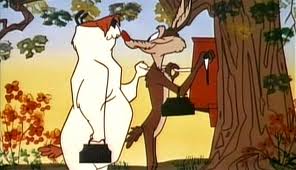Gone to the Dogs: Idioms
Last week, we looked at feline-inspired idioms with The Cat’s Out of the Bag. For today’s Amaze-ing Words Wednesday, let’s take another trail in the labyrinth where we find our canine companions.

Check out the following dog-related idioms and their origins.
Barking up the wrong tree. Back in the 1800s, people went raccoon hunting. (Meanwhile, all I have to do is wait for the raccoons to show up to my porch where my sons will shoot them with airsoft bullets to scare them away.) Since raccoons are nocturnal, hunts occurred at night when sight was limited and scent was a better clue. Hunters would bring dogs to pick up the scent. If a raccoon climbed up a tree, a dog would stand at the base and bark up at it, signaling the hunter to climb the tree and get his prey. But if the hunter climbed and no raccoon was found, that dog was “barking up the wrong tree.”
Gone to the dogs. In medieval times, the rich discarded their table scraps and partially eaten food by throwing out for the dogs. Impoverished, starving folk could be found sifting through the leftovers with the dogs, looking for something to eat. Thus, one who is down on his luck and has deteriorated has “gone to the dogs.”
Dog eat dog. This is usually expressed as “It’s dog eat dog out there!” or “It’s a dog-eat-dog world.” According to Christine Ammer, author of Cool Cats and Top Dogs (and Other Beastly Expressions), in 43 B.C. a Roman man of letters Marcus Tarentius Varro said “Canis caninam non est.” Had you been studying your Latin faithfully, you would know that translates as “Dog does not eat dog.” He meant to suggest that even animals like dogs have limits and will not destroy their own kind. Surely, we humans could show some restraint as well!
But as any pit bull gambler and schoolyard graduate will note, dogs do eat dogs. Thus, by the Industrial Revolution, the phrase “dog eat dog” to connote a cut-throat, competitive world had taken hold. By 1789, the London Times printed: “As it is an established fact, that sharper will not rob sharper, nor dog eat dog.”
Every dog has his day. Stuart and Doris Flexner explain in Wise Words and Wives’ Tales: The Origins, Meanings and Time-Honored Wisdom of Proverbs and Folk Sayings Olde and New that medieveal Dutch scholar Erasmus gave the history on this one. He said that the phrase was used after the death of Euripides, a Greek playwright, who was mauled and killed by a pack of dogs in 405 B.C. (presumably loosed upon him by a rival). The saying refers to the presumption that even the most lowly person will at some time get revenge on an oppressor, no matter how powerful the oppressor may be.
Greek biographer Plutarch first recorded the phrase in Moralia (written in 95) as “Even a dog gets his revenge.” In 1539, Englishman Richard Taverner wrote, “A dogge hath a day” (Proverbes). By 1670, John Ray gave us “every dog hath his day” (A Collection of English Proverbs). It’s a great saying, but still a shame that Euripedes had to get ripped to shreds by canines for this phrase to make its way to us.
Working like a dog. I’ve never seen dogs engaged in particularly hard work myself. However, Looney Tunes got this one right with its Ralph E. Wolf & Sam Sheepdog cartoons. Sheepdogs are said to work from dawn to dusk for nothing more than food, a place to sleep, and affection. Perhaps this phrase should be “working like a sheepdog,” since no one has accused chihuahuas of being overly taxed.
Dog days. I became especially interested in this one after downloading Florence + The Machine’s “Dog Days Are Over.” Ancient Romans noted that the hottest days of the year (late July/early August) coincided with the appearance of Sirius, the Dog Star, and thus believed that the star contributed to the heat of the day. Therefore, these hot summer days became known as the dog days.
Wag the dog. You might know this phrase from 1997 film of its title with Robert de Niro and Dustin Hoffman. However, the original proverb came from the 19th century. Rudyard Kipling wrote in The Conundrum of the Workshops (1892): “We know that the tail must wag the dog, for, the horse is drawn by the cart.” What that means is that a tail wagging the dog is like putting the cart before the horse. So to “wag the dog” is simply to put the wrong priority first.
Of course, there is the idiom that includes both canines and felines: It’s raining cats and dogs. Where did we get that one? There is an ancient nautical myth that cats had some sort of influence over storms, and a Norse (Viking) myth that dogs were a symbol of storms. Ancient mariners believed that cats caused the rain and dogs brought the gales. Thus a major thunderstorm was referred to as “raining cats and dogs.” The phrase is first recorded in literature in 1738 by Jonathan Swift (A Complete Collection of Polite and Ingenious Conversation).
Are you a cat person, a dog person, both, or neither? Can you think of any other dog idioms? What are your favorite canine-inspired sayings?
Sources: The Pet Wiki, The Phrase Finder, Red Herrings & White Elephants by Albert Jack, Word Detective, WordOrigins.org, UsingEnglish.com, Cesar’s Way, Wikipedia
ROW80: I am participating in Round 2. My goals can be found by clicking the #ROW80 tab at the top. I will post my first update on Sunday, April 8.
Julie Glover
Julie Glover loves whimsy, wit, and what-ifs, but her stories also explore real-life experiences and deep-down emotions. She believes we're stronger than we think, laughter is a necessary survival skill, and you can never own too many pairs of boots.
